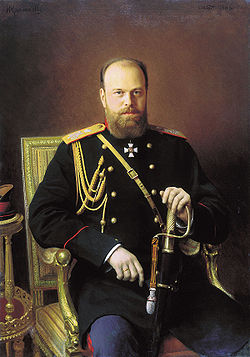
Alexander III (1881-1894)

Alexander III, the second son of Alexander II, was born in St. Petersburg on February 26, 1845 and was never trained for statesmanship, but Nicholas, the heir apparent, died an early death in 1865 and Alexander inherited his crown and his fiancée Princess Dagmar of Denmark, who took the name of Maria in second baptism. After the assassination of his father, Alexander III came to the throne on March 1, 1881, at the age 36 and was crowned on May 15, 1883. Fearing an attempt on his life, he refused to live in the Winter Palace; instead, he lived away from St. Petersburg in Gatchina, the palace of his great-grandfather, which was designed like a medieval fortress surrounded by ditches and watchtowers. As well as Nicholas started his reign with the Decembrist’s execution, Alexander III ordered five terrorists belonging to the People’s Will group – Zhelyabov, Perovsky, Kibalchich, Mikhailov and Rysakov, who fatally wounded by a bomb his father Alexander II, to be hanged. The Tsar also ordered a church to be constructed on the site of Alexander’s assassination (known as Saviour on the Spilt Blood) even in a few days after his reign, which was to bring back his grandfather’s formula: “Autocracy, Orthodoxy, Ethnicity” – Alexander decided to reject his father’s reforms that would have introduced a few elected representatives into the apparatus of government, and to reaffirm the principle of autocracy without a change. Alexander III was a subtle connoisseur of the arts, and did much to replenish Hermitage collections. He had an excellent private collection of Russian paintings too. But he was not equally enthusiastic about statesmanship and evaded warfare at all costs as well as other sorts of complications. He made an essential alliance with France in 1889, and implemented several reforms in Russia to take the edge off social tensions: he reduced land redemption fees, abolished the poll tax, issued a factory statue, and cut women’s and underage hands’ workday. In the summer of 1894, Alexander III’s kidney began acting up, and the imperial family moved to their estate in the Crimea for his health. The doctors paced the tsar on a strict diet, but it did not help and Alexander condition worsened in autumn. On October 20, 1894 the tsar passed away with his family watching, and the crown went to Nicholas II.
|
Copyright © 2004-2005 Palytra Travel
All rights reserved |
Website development |

